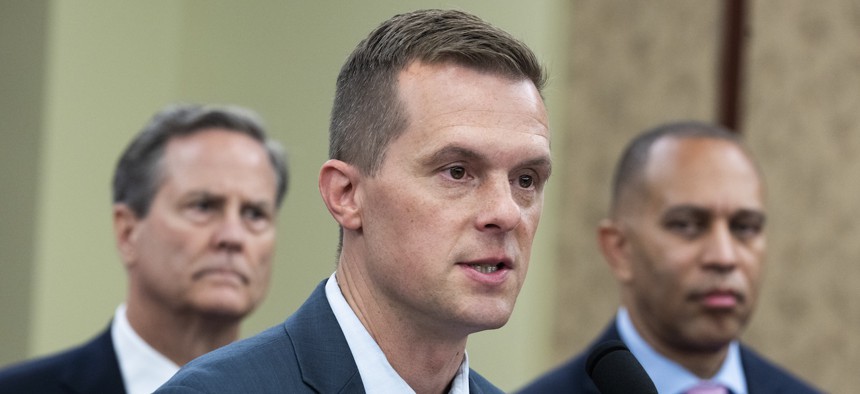
From left: Reps. Donald Norcross, D-N.J., Jared Golden, D-Maine, and House Minority Leader Hakeem Jeffries, D-N.Y., conduct a news conference in the Capitol Visitor Center to oppose a "union-busting executive order by President Donald Trump," that eliminated collective bargaining rights for federal workers, on July 17, 2025. Tom Williams/CQ-Roll Call, Inc via Getty Images
Lawmakers pursue parallel paths toward blocking Trump’s anti-union order
While House Democrats and unions are working over the August recess to secure signatures on a discharge petition to force the chamber to consider a bill overturning the president’s edict stripping two-thirds of federal employees of their collective bargaining rights, the House NDAA includes language blocking its implementation at the Pentagon.
As federal employee unions continue to fight the Trump administration’s effort to strip two-thirds of the federal workforce of their collective bargaining rights in federal courts, a bipartisan group of lawmakers are working on multiple fronts to pass legislation overriding the president’s executive order.
Trump in March signed an executive order citing a little-used provision of the 1978 Civil Service Reform Act to bar unions from a host of federal agencies and agency subcomponents under the guise of national security. Democrats and union leaders argue that the citation of national security is mere pretext for retaliating against labor groups that have filed lawsuits challenging the administration’s workforce policies.
Though the debate over Trump’s edict has been relatively quiet in Congress since the April introduction of the Protect America’s Workforce Act (H.R. 2550), which would nullify Trump’s executive order and bar federal funds from being used to implement it, two separate developments last week suggest there may be more an for overriding the president even in the Republican-controlled House.
First, Democrats announced last week that with the legislation, introduced by Reps. Jared Golden, D-Maine, and Brian Fitzpatrick, R-Pa., boasting 222 cosponsors, they have begun circulating a discharge petition that would force its consideration on the House floor. At a press conference last week, Golden said unions within the government’s national security agencies improve mission delivery, contrary to Trump’s assertions.
“If it comes to the House floor, we can win,” he said. “We’ve got 222 cosponsors, including seven Republicans, which is more than enough to pass the bill, but there has been no willingness to bring it to the floor from the Republican leadership. All of those who cosponsored our bill did so because they believe these workers’ rights are worth protecting and that when workers bargain collectively, it produces a fair workplace where employees have dignity and respect.”
“Congress granted collective bargaining rights for federal employees decades ago, and they’ve been upheld for years by administrations of both parties—Republican and Democrat,” said Rep. Debbie Dingell, D-Mich. “Now, thousands have had those rights taken away. I want to be very clear: this action is clear retaliation and union busting, plain and simple. And it’s a threat to organized labor and workers everywhere.”
And over in the House Armed Services Committee, that panel narrowly voted to add language to the 2026 National Defense Authorization Act that would bar the executive order’s implementation at the Defense Department. Rep. Donald Norcross, D-N.J., was able to secure the votes of Reps. Don Bacon, R-Neb., Mike Turner, R-Ohio, and Derrick Van Orden, R-Wisc., to successfully amend the annual must-pass bill.
“The Trump administration has launched one of the biggest attacks on American labor in history, stripping collective bargaining rights from more than 1 million federal employees, including at DOD,” Norcross said during a markup last week. “The justification was national security concerns, but the facts tell a very different story . . . This executive order is blatant union busting, and it is clear that this effort is not based on national security but instead on retaliation for unions’ defending their members’ rights, and as a tactic to make it easier to fire employees.”
Rep. Jeff Crank, R-Colo., described the amendment as “a serious overreach,” and suggested that the measure was an effort by Democrats to “score political points” with labor groups.
“This EO simply says that when it comes to defense, the president needs the flexibility to act quickly and decisively, not get bogged down in union negotiations,” Crank said. “[This] amendment needlessly restricts the president’s constitutional authority to manage the executive branch and protect the nation.”
Since the executive order—and although agencies have insisted to federal judges that they are waiting for judicial assent before implementing Trump’s edict—agencies have cancelled the automatic collection of union dues from federal employees’ paychecks and ceased participating in collective bargaining negotiations and grievance and arbitration proceedings.
Share your newstips with us:
Erich Wagner: ewagner@govexec.com; Signal: ewagner.47
NEXT STORY: Most Americans oppose RIFs, but a good-government group says anti-layoff messaging needs to be improved







